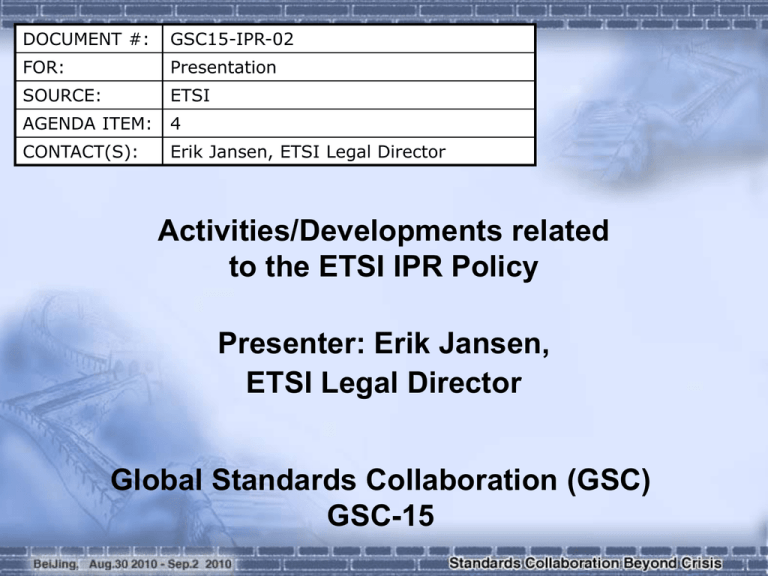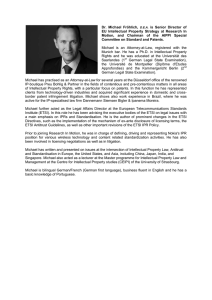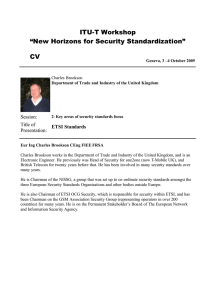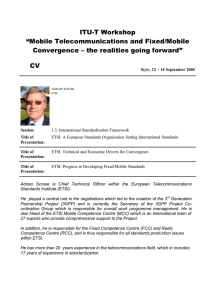
DOCUMENT #:
GSC15-IPR-02
FOR:
Presentation
SOURCE:
ETSI
AGENDA ITEM:
4
CONTACT(S):
Erik Jansen, ETSI Legal Director
Activities/Developments related
to the ETSI IPR Policy
Presenter: Erik Jansen,
ETSI Legal Director
Global Standards Collaboration (GSC)
GSC-15
Background / main characteristics of
the ETSI IPR Policy
No technical reservation for the inclusion of IPRs in standards.
Early identification and disclosure of essential IPRs.
Ensuring the future applicability of the standards in full respect of the
rights of the IPR owner by requesting irrevocable FRAND licensing
undertaking.
No involvement of ETSI in any commercial discussion on IPR matters
(i.e. terms and conditions of the licenses to be determined by the
parties of the agreement).
Voluntary, unilateral, public ex ante disclosures of licensing terms for
the sole purpose of assisting members in making informed (unilateral
and independent) decisions in relation to whether solutions best meet
the technical objectives, are not prohibited under the ETSI IPR Policy.
In this context, ETSI provides a depository for URLs of IPR owners,
which contain the relevant information.
2
ETSI IPR Special Committee
Since GSC# 14 two meetings of the ETSI IPR SC have
taken place. IPR SC 06 (02-04/09/2009) and IPR SC 07
(08-09/02/2010).
Dirk Weiler (Nokia Siemens Networks) is the Chairman of
the IPR SC and the IPR SC elected in IPR SC 07 Serge
Raes (France Telecom) as Vice-Chairman.
The main two topics discussed at these IPR SC were the
database restructuring of the ETSI IPR data base, the
“DARE Project”, and the elaboration of an ETSI Guide on
Software copyright.
3
DARE Project (1) IPR Transparency
Increase IPR
Transparency
Current architecture
Requirements
Target architecture
1.Consistent data
2.Normalised numbers
3.Patent families
4.Top-down overview
5.History tracking
6.Scanned forms
7.User SQL queries
8.Revised UI
4
DARE Project (2) Status/Timeline
In September 2009 the analysis phase was finalized and
the construction phase started. Phase 1 of the construction
phase was achieved end of January 2010, i.e. first scope
application with limited functionalities.
Phase 2 of the construction and the migration of the legacy
data has been started.
Field tests by member companies are scheduled for
autumn 2010
Acceptance testing scheduled for end of 2010
DARE system to be in operation in Q1 2011
5
DARE Project (3) Current Architecture
USERS
XML interface
Web interface
(search, display)
Online
declaration
Database of
Declarations
6
6
DARE Project (4) Target Architecture
Current
System
(FROZEN)
USERS
Scanned
Declarations
(NEW)
Generic Query
Access (NEW)
Improved web
interface
(REPLACED)
IPR
Family
ETSI
Deliverabl
e
m
ETSI
Project
m
m
Improved Online declaration
(REPLACED)
Migration
Module (NEW)
Declaration
Modification
History (NEW)
Consistency
Checks (NEW)
n
n
IPR
n
RELATIONAL DATABASE
(REPLACED)
Reporting
(NEW)
7
Other ETSI
applications
Data normalisation
and synchronisation
(NEW)
EPO
7
DARE Project (5)
List of Target System Features
Key features
Secondary features
•
Declaration
•
Search for declarations and patents
•
Generic screen for declaration detail
(modify, display)
•
Declaration life cycle
•
Scanned documents
•
External identifiers
Consistency Checks
•
ETSI management fields
Dynamic Reporting
•
Prefilled submission form for
online submissions
Data Normalisation
Patent Family Handling
Modification history
Patent Essentiality*
Generic Query Access
* The database provides data that is based on the
information received. ETSI does not check nor
investigate whether an IPR is valid or essential.
All
features address the key
requirement “Increase IPR Transparency”,
and are therefore mandatory for the target
system architecture.
•
•
Emails
•
Notification emails
•
Modifiable email templates
Master data & user management
•
Display screens for master data instance
(with links to related elements)
•
Master data management
•
User management
8
ETSI Guide on Software Copyright (1)
Agreement that there is a need for guidance on software copyright
within ETSI.
Such Guide on Software Copyright will be discussed/ elaborated in the
IPR SC.
Initial Position:
Definition of IPR in ETSI IPR Policy includes copyrights.
The incorporation of copyrighted software in a standard or technical
specification raises additional issues that need to be addressed.
Growing number of copyright requests for the use of software shows
the need for guidance.
Considerable discussion took place in IPR SC 6 and IPR SC 7. No final
consensus was achieved but it was acknowledged that the discussion
had enabled wider common understanding of the issue and that a
drafting group should discuss and prepare a text for the next meeting
based on the following assumptions:
9
ETSI Guide on Software Copyright (2)
Assumptions:
• to find a solution which maintains the present status quo
• default assumption that copyright will be granted
• it does not put an extra burden on the TBs
• it does not increase the liability of contributors concerning third party
copyright
• there was strong support from many meeting participants that they
don't consider to collect royalties on the discussed copyrights and
that therefore a copyright approach without royalties and liabilities
could be considered as default
• to consider the approach already taken by other SDOs e.g. ANSI,
ITU, etc.
• It was also agreed that such a proposal should:
try to not modify the IPR Policy itself.
result in either a new "Software Guide" or a modification to the
existing IPR Guide.
10
MoU with EPO
Signed in November 2009
Increase co-operation in matters of standards and intellectual property:
- share knowledge, information and documentation on technology
and standards.
- collaborate on education related to standards and IP issues.
- to co-operate by interlinking ETSI’s enhanced intellectual property
rights database system with the EPO’s publicly accessible patent
databases.
The MoU is a further milestone in the long-lasting and fruitful
relationship between ETSI and EPO, which started when EPO became
a member of ETSI in 2003. Among a variety of collaborative actions,
ETSI has provided EPO examiners access to its documents in order to
facilitate their work and improve the identification of “prior art”.
11
Conclusions
ETSI IPR Policy continues to fairly balance all the
interests involved.
ETSI IPR Policy is one of the key elements for the
success of ETSI’s globally-applicable standards.
ETSI is effectively facing new challenges and,
where necessary, adapts/clarifies its Directives to
meet the requirements of a changing environment.
12
Thank you for your attention
Legal@etsi.org
GSC#15 – Beijing 2010 30 August-2 September
Erik Jansen, LL.M.
ETSI Legal Director
Copyright © ETSI 2010. All rights reserved



